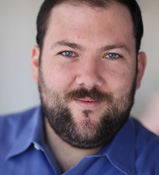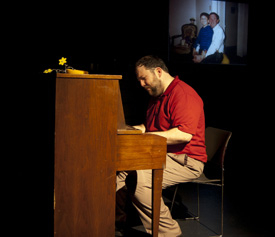After his Dad's death, MFA theater student Michael Thomas Walker spent nearly a year researching the man

When Michael Thomas Walker’s father died of a suspected suicide in February 2011, the actor did what came naturally: He took his father’s story to the stage.
Soon after receiving word of his father’s death, Walker, a graduating MFA theater student Rutgers' Mason Gross School of the Arts, plunged into a nine-month independent study. He researched, conducted interviews back in his native Huntsville, Alabama, and emerged with a dynamic one-man show about his father’s life, which included a struggle with spinal polio that left him with a lifelong limp, stints in prison for embezzlement and creative attempts to avoid child-support payments.
In March 2012, Walker premiered the show, an unsparing but affectionate portrait called Bubba, at the university’s Jameson Studio Theater. The show plays again at Jameson on Douglass Campus through May 5.
“I don’t consider myself a writer. I’m a storyteller,” says the 30-year-old Walker, who is exploring opportunities to mount Bubba off-Broadway. “After eating, my grandmother and aunt would tell stories. That was the entertainment. Aunt Louise, one glass of wine and she’d get going. We still do it now.”
Walker may not see himself as a playwright, but directing faculty member Pamela Berlin does. After seeing Bubba, Berlin says, she asked Walker if he’d ever written before.
“He said, ‘No,’ ” Berlin recalls. “I said, ‘You have such a gift.’ He’s willing to make a wonderful fool of himself. His challenge was to strip that away and access the vulnerable part of himself and be real. I’m a huge fan of Michael’s.”
Bubba is a stew of live piano music, Huntsville history, family anecdotes and polio stats; the show even features a humorous recollection of the deputy sheriff’s arranging conjugal visits between Walker’s parents. Bubba is rife with one-liners, such as Walker’s description of one of his dad’s buddies – “He’s like Alabama’s version of Hunter Thompson, without the literary streak” – but the show is threaded with poignant moments, too, as when Walker offers to perform a dance “to celebrate the two ‘good’ legs I am so fortunate to have.”
Walker says his mom, whose grandfather traveled the vaudeville circuit, supported his acting aspirations.
“I never took to baseball, soccer, football,” he says. “Mom put me in acting class, and I loved it. I got it. It’s in my bones.”

After Walker’s graduation from the University of Alabama, he found success in musical theater, playing Horton in the national tour of Seussical and Edna Turnblad in the national tour of Hairspray. But the actor says the Mason Gross School Theater Department coaxed him to craft more nuanced performances.
“I trust myself more. I look at myself in a three-dimensional way, not just, ‘I sing and I’m funny,’ ” Walker says. “. . . Before I came here, I wasn’t ready to go to dark places. After the show, [Directing and Acting professor] Bill Carden said, ‘This is what you came here to do.’ ”
He admits that writing Bubba was a stretch. But he also says the process “allowed me to confront the fears, anger and sorrow that I had [about my father’s death]” and to make peace with his father’s choices.
“I learned in graduate school: Whatever scares me usually means there’s something good [there],” Walker says. “I was afraid of writing a play for a very long time . . . I wouldn’t be able to do the one-man show without [my] training here.”
Perhaps the most memorable lesson Walker has learned at Mason Gross occurred in a class he never attended.
According to Walker, upon sharing news of his father’s death with MFA Acting head Deborah Hedwall, she “went to class and told everyone, asked for a moment of silence and made everyone keep working.
“She was teaching the lesson that you must do the work,” says Walker, who plans to move to New York City after graduation and perhaps write a follow-up to Bubba. “What a good lesson. Because it’s true the show must go on.”